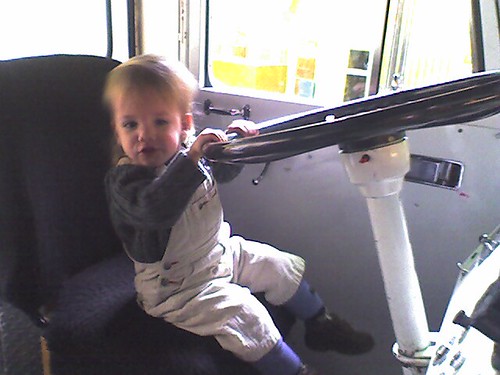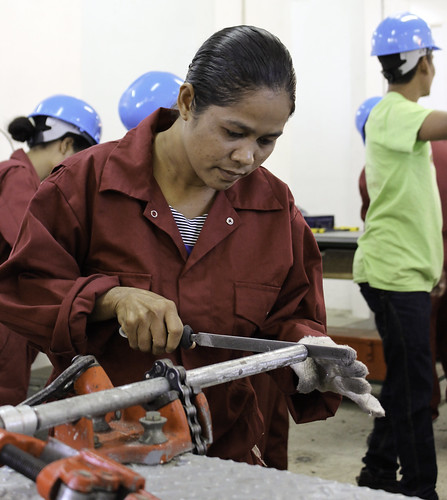31st Sunday in Ordinary Time (C)
Picture: cc Karl Gruenwald
Sisters and brothers, do you ever encounter people who simply refuse to accept their own limitations? How do you feel? As you know, young children often have this tendency. I have a vague memory of how, when I was very little, I used to want to drive my father’s car. It didn’t matter to me that my feet couldn’t reach the pedals. If I had my way, I would have tried to start the engine and drive off by myself. I simply refused to accept my own limitations.
Of course, we consider this tendency in little children cute and adorable. But what about when we find it in an adult? How do you feel, for example, when someone at work stubbornly refuses to accept your help with a project? Even though the person hasn’t received the required training. And then you end up having more work to do, because you have to tidy up the mess that the person leaves behind. How do you feel then?
I’m not sure about you, my dear friends. But my typical reaction is irritation and anger. I must confess that I have little patience for this sort of thing in others. The tendency to refuse to accept one’s own limitations. And yet I do realise that there is a reason for my impatience. It is probably because I myself am prone to the same thing. I too find it difficult to admit my own limitations. I too often insist on doing things that are actually beyond me. Such as when I try to control everything in my life, for example. And then get stressed out or upset when I don’t succeed.
Which is probably why there’s a part of me that feels uneasy when I hear about those troublesome people in the gospel reading today. The ones who complain about Jesus. The gospel tells us that, when these people saw what was happening between the Lord and Zacchaeus, they protested by saying, He has gone to stay at a sinner’s house. Do you know why this makes me uneasy?
Well, first of all, it’s clear to me that these people are reacting in a way that demonstrates their failure to recognise their own limitations. Not only do they judge Zacchaeus a sinner, they also presume to judge the Lord himself. But on what do they base their judgment? Only on what they can see with their eyes. Eyes which, by the way, are obstructed by prejudice. Eyes that see only what they want to see. Eyes that refuse to acknowledge their own inability to read another person’s heart. In order to uncover the goodness that may be hidden there. The goodness that is a sign of God’s imperishable spirit present in all.
I feel uneasy because, I too find myself often tempted to react in the same way. I too am prone to making snap judgments about the moral condition of my neighbours. Even if I may not complain aloud, I look down on them in my heart. And, by doing this, I fail to acknowledge my own limitations. I refuse to recognise that I really cannot read another’s heart. Yet I insist on judging the person’s goodness. It’s as though I were a little boy again. Stubbornly insisting on driving my father’s car. Even though my feet are not able to reach the pedals. Except that I’m not a cute little boy anymore. And I should really know better.
Perhaps this is why I find myself drawn to that little man in our gospel reading today. For, even though the public considers him a serious sinner, Zacchaeus has at least one redeeming quality. The very thing that I find so sorely lacking in myself. He has the ability and willingness to recognise his own limitations. I imagine that, especially in Jesus’ day, it must not have been very dignified for a grown man to be seen climbing a tree in broad daylight. Let alone a senior government official like Zacchaeus. And yet, that is precisely what he does. Why? The reading tells us it is because he was too short and could not see Jesus for the crowd. Clearly here is a man who is able to accept his own limitations. And is willing to take steps to address them.
But that’s not all. There is something deeper. For we’re told that Zacchaeus climbs the tree only because he is anxious to see Jesus. But why does he wish to see Jesus in the first place? Could it be that it’s because Zacchaeus is painfully aware not only of his physical limitations. But also, and especially, of his spiritual shortcomings? Could it be that, just as he climbs up a tree because he knows he is small in stature, so too does he seek out Jesus because he realises that he is poor in spirit?
And it is helpful for us to consider what happens as a result of Zacchaeus’ humility. His willingness to recognise his own limitations. Jesus invites him to come down from the tree, and then goes to stay at his house. In Jesus’ response, the poor tax collector experiences something that Pope Francis himself experienced at the age of 17. The merciful gaze of God calling him to follow the Lord. The same merciful gaze described so beautifully for us in the first reading: In your sight, Lord, the whole world is like a grain of dust…. Yet you are merciful to all… and overlook men’s sins so that they can repent.
Moved by this intimate experience of God looking tenderly and mercifully upon him, Zacchaeus declares: I am going to give half my property to the poor, and if I have cheated anybody I will pay him back four times the amount. We often consider these words an expression of his intention to repent. A pledge for the future. A promise to turn over a new leaf. But there is also another possible interpretation.
Scripture scholars tell us that, in the original Greek, Zacchaeus’ words are actually in the present tense. So that rather than promising to do something in the future, the man may actually be describing what he is already doing in the present. I am already giving half my property to the poor… But, if this is true, then why does Jesus say that salvation has come? Perhaps salvation comes to Zacchaeus when he is led to recognise something that he had not appreciated before. By gazing mercifully upon him, Jesus helps him to recognise the goodness in himself. So that, just as the sycamore tree gives Zacchaeus the height to look upon the Lord. So too does the merciful gaze of Jesus help him to see the depths of the goodness of God, already present and active in his life. And, in seeing this, the man is saved.
My dear friends, could this be what salvation looks like for us as well? Could it be that this is what St. Paul is referring to in the second reading? When he prays that our God will make you worthy of his call, and by his power fulfil all your desires for goodness… Could this be our path to salvation? First to acknowledge our limitations. Then to seek the Lord with all our heart. And to experience him looking mercifully upon us. Helping us to recognise God’s goodness already powerfully at work in our own lives. And then to be moved to follow him on the Way that leads to life. The Way to Calvary and beyond.
My dear friends, could it be that our readings present us with a choice between two people? The one who is willing to acknowledge his own limitations and the one that is not. Could it be that we are being invited to choose between a humble little man climbing a sycamore tree, and a stubborn little boy insisting on driving his father’s car?
My dear friends, which of these will you choose to imitate today?




